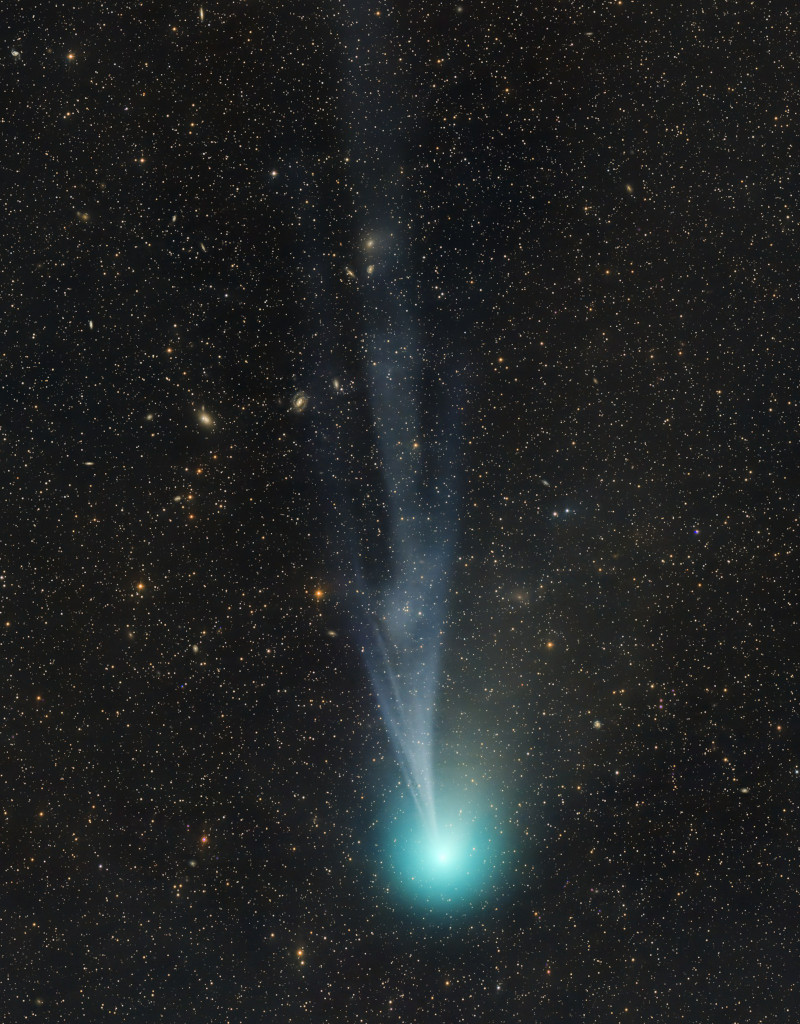16. February 2024
彗星 12P/Pons-Brooks ê 彗尾結構

探索宇宙1!逐工會揀一幅無仝款 ê 影像抑是相片,𤆬你熟似咱這个迷人 ê 宇宙,閣有專業天文學者2為你3解說4。
- 原始文章:Structure in the Tail of Comet 12P/Pons-Brooks
- 影像來源 kah 版權:Dan Bartlett
- 台文翻譯:An-Li Tsai (NSYSU)
[漢羅] 彗星 12P/Pons-Brooks ê 彗尾結構
彗星 12P/Pons-Brooks tī 4 月 21 ê 時陣,會閣再行到近日點,所以伊紲落來會愈來愈光。 這粒 哈雷型 ê 週期彗星有青色 ê 彗鬚,咱這馬已經會當用細台望遠鏡看著伊矣。 這粒活跳跳 ê 彗星有 藍色 ê 離子尾溜,這是去予 太陽風 歕出來 ê 彗鬚,較暗、嘛較歹看著。 這張影像 是 kā 2 月 11 暗暝幾若張感光影像疊起來 ê 結果,才會當看著這个足暗 ê 尾溜,kah 伊 ê 詳細結構。 這張影像有 2 度闊,內底有暗暗 ê 恆星、背景星系,就 tī 北天 ê 蝎虎座 方向。 是講,彗星 12P tī 4 月 21 近日點 ê 時陣,kah 發生 tī 4 月 8 號 ê 日全食,才差 2 禮拜爾爾。 時到,地球天頂會同齊出現彗星 kah 日全食。
[POJ] Hūi-chheⁿ 12P/Pons Brooks ê Hūi-bóe kiat-kò͘
Hūi-chheⁿ 12P/Pons Brooks tī 4 goe̍h 21 ê sî-chūn, ē koh-chài kiâⁿ kàu kīn-ji̍t-tiám, só͘-í i sòa--lo̍h-lâi ē lú-lâi-lú kng. Chit lia̍p Ha-lûi-hêng ê chiu-kî hūi-chheⁿ ū chheⁿ-sek ê hūi-chhiu, lán chit-má í-keng ē-tàng iōng sè-tâi bōng-oán-kiàⁿ khòaⁿ-tio̍h i ah. Chit lia̍p oa̍h-thiàu-thiàu ê hūi-chheⁿ ū nâ-sek ê lī-chú bóe-liu, che-sī khì hō͘ thài-iông-hong pûn chhut-lâi ê hūi-chhiu, khah àm, mā khah pháiⁿ khòaⁿ--tio̍h. Chit-tiuⁿ iáⁿ-siōng sī kā 2 goe̍h 11 àm-mê kúi-nā tiuⁿ kám-kng iáⁿ-siōng tha̍h khí-lâi ê kiat-kó, chiah ē-tàng khòaⁿ-tio̍h chit-ê chiok àm ê bóe-liu, kah i ê siông-sè kiat-kò͘. Chit-tiuⁿ iáⁿ-siōng ū 2 tō͘ khoah, lāi-té ū àm-àm ê hêng-chheⁿ, pōe-kéng seng-hē, to̍h tī pak-thian ê Giat-hó͘-chō hong-hiòng. Sī-kóng, hūi-chheⁿ 12P tī 4 goe̍h 21 kīn-ji̍t-tiám ê sî-chūn, kah hoat-seng tī 4 goe̍h 8 hō ê ji̍t-choân-si̍t, chiah chha 2 lé-pài niā-niā. Sî-kàu, Tē-kiû thiⁿ-téng ē tâng-chê chhut-hiān hūi-chheⁿ kah ji̍t-choân-si̍t.
[KIP] Huī-tshenn 12P/Pons Brooks ê Huī-bué kiat-kòo
Huī-tshenn 12P/Pons Brooks tī 4 gue̍h 21 ê sî-tsūn, ē koh-tsài kiânn kàu kīn-ji̍t-tiám, sóo-í i suà--lo̍h-lâi ē lú-lâi-lú kng. Tsit lia̍p Ha-luî-hîng ê tsiu-kî huī-tshenn ū tshenn-sik ê huī-tshiu, lán tsit-má í-king ē-tàng iōng sè-tâi bōng-uán-kiànn khuànn-tio̍h i ah. Tsit lia̍p ua̍h-thiàu-thiàu ê huī-tshenn ū nâ-sik ê lī-tsú bué-liu, tse-sī khì hōo thài-iông-hong pûn tshut-lâi ê huī-tshiu, khah àm, mā khah pháinn khuànn--tio̍h. Tsit-tiunn iánn-siōng sī kā 2 gue̍h 11 àm-mê kuí-nā tiunn kám-kng iánn-siōng tha̍h khí-lâi ê kiat-kó, tsiah ē-tàng khuànn-tio̍h tsit-ê tsiok àm ê bué-liu, kah i ê siông-sè kiat-kòo. Tsit-tiunn iánn-siōng ū 2 tōo khuah, lāi-té ū àm-àm ê hîng-tshenn, puē-kíng sing-hē, to̍h tī pak-thian ê Giat-hóo-tsō hong-hiòng. Sī-kóng, huī-tshenn 12P tī 4 gue̍h 21 kīn-ji̍t-tiám ê sî-tsūn, kah huat-sing tī 4 gue̍h 8 hō ê ji̍t-tsuân-si̍t, tsiah tsha 2 lé-pài niā-niā. Sî-kàu, Tē-kiû thinn-tíng ē tâng-tsê tshut-hiān huī-tshenn kah ji̍t-tsuân-si̍t.
[English] Structure in the Tail of Comet 12P/Pons-Brooks
Heading for its next perihelion passage on April 21, Comet 12P/Pons-Brooks is growing brighter. The greenish coma of this periodic Halley-type comet has become relatively easy to observe in small telescopes. But the bluish ion tail now streaming from the active comet's coma and buffeted by the solar wind, is faint and difficult to follow. Still, in this image stacked exposures made on the night of February 11 reveal the fainter tail's detailed structures. The frame spans over two degrees across a background of faint stars and background galaxies toward the northern constellation Lacerta. Of course Comet 12P's April 21 perihelion passage will be only two weeks after the April 8 total solar eclipse, putting the comet in planet Earth's sky along with a totally eclipsed Sun.
詞彙學習
| 漢羅 | POJ | KIP | 華語 | English |
|---|---|---|---|---|
| 彗星 12P/Pons-Brooks | hūi-chheⁿ cha̍p-jī P Pons-Brooks | huī-tshenn tsa̍p-jī P Pons-Brooks | 12P/龐士-布魯克斯彗星 | Comet 12P/Pons-Brooks |
| 彗尾 | hūi-bóe | huī-bué | 彗尾 | tail of comet |
| 近日點 | kīn-ji̍t-tiám | kīn-ji̍t-tiám | 近日點 | perihelion |
| 彗鬚 | hūi-chhiu | huī-tshiu | 彗髮 | coma |
| 週期彗星 | chiu-kî hūi-chheⁿ | tsiu-kî huī-tshenn | 週期彗星 | periodic comet |
| 哈雷型彗星 | Ha-lûi-hêng hūi-chheⁿ | Ha-luî-hîng huī-tshenn | 哈雷型彗星 | Halley-type comet |
| 離子尾溜 | lî-chú bóe-liu | lî-tsú bué-liu | 離子尾 | ion tail |
| 太陽風 | thài-iông-hong | thài-iông-hong | 太陽風 | solar wind |
| 蝎虎座 | Giat-hó͘-chō | Giat-hóo-tsō | 蝎虎座 | Lacerta |
| 日全食 | ji̍t-choân-si̍t | ji̍t-tsuân-si̍t | 日全食 | total solar eclipse |